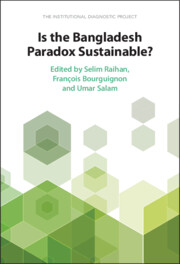Shaftesbury Road, Cambridge cb2 8EA, United Kingdom
One Liberty Plaza, 20th Floor, New York, NY 10006, USA
477 Williamstown Road, Port Melbourne, VIC 3207, Australia
314–321, 3rd Floor, Plot 3, Splendor Forum, Jasola District Centre, New Delhi – 110025, India
103 Penang Road, #05–06/07, Visioncrest Commercial, Singapore 238467
Cambridge University Press is part of Cambridge University Press & Assessment, a department of the University of Cambridge.
We share the University’s mission to contribute to society through the pursuit of education, learning and research at the highest international levels of excellence.
Information on this title: www.cambridge.org/9781009284691
© Selim Raihan, François Bourguignon, and Umar Salam 2023
This work is in copyright. It is subject to statutory exceptions and to the provisions of relevant licensing agreements; with the exception of the Creative Commons version the link for which is provided below, no reproduction of any part of this work may take place without the written permission of Cambridge University Press.
An online version of this work is published at doi.org/10.1017/9781009284677 under a Creative Commons Open Access license CC-BY-NC-SA 4.0 which permits re-use, distribution and reproduction in any medium for non-commercial purposes providing appropriate credit to the original work is given, any changes made are indicated, and the new work is published under the same license terms. To view a copy of this license, visit https://creativecommons.org/licenses/by-nc-sa/4.0
All versions of this work may contain content reproduced under license from third parties.
Permission to reproduce this third-party content must be obtained from these third-parties directly.
When citing this work, please include a reference to the DOI 10.1017/9781009284677
First published 2023
A catalogue record for this publication is available from the British Library
A Cataloging-in-Publication data record for this book is available from the Library of Congress
LC record available at https://lccn.loc.gov/2022062030
ISBN 978-1-009-28469-1 Hardback
Cambridge University Press & Assessment has no responsibility for the persistence or accuracy of URLs for external or third-party internet websites referred to in this publication and does not guarantee that any content on such websites is, or will remain, accurate or appropriate.

